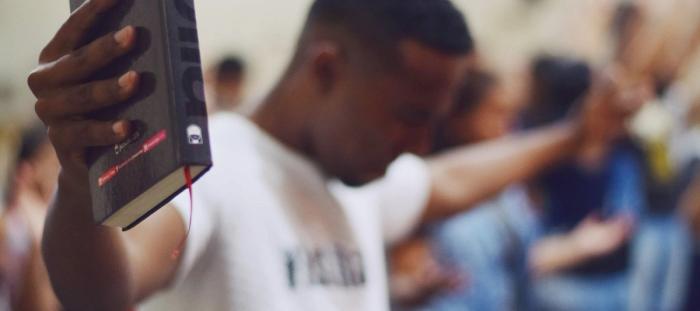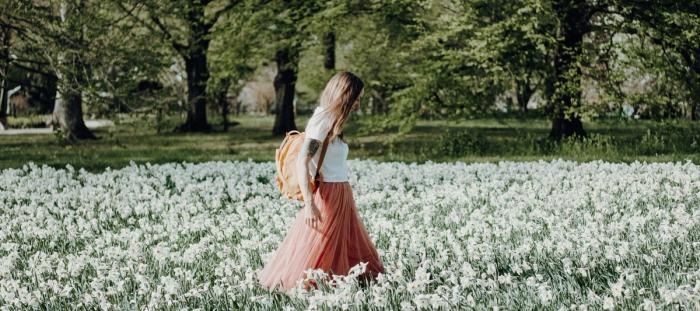We sat cross-legged in a semi-circle, juice boxes and graham crackers beside us. Our teacher sat before us, holding Fisher-Price plastic dolls as tears speckled her face.
One doll represented Naomi, another represented her husband, Elimelech. We watched as they married and their family expanded. Their two young sons, Mahlon and Chilion, grew to become little boys, who then became hungry little boys as famine devoured their home country of Judah. They gathered all of their belongings, left God’s promised land, and sojourned to Moab, where their family found food and shelter—where their boys continued to grow.
We watched Naomi’s family fall apart. First, she buried her husband, next her sons after they’d aged and married. We saw Naomi, alone, surrounded by three graves in the foreign land of Moab, with nothing left to her name (Ruth 1:5).
On the floor of my Hebrew class in seminary, Naomi’s history became real life to me. Blink and we might miss the life lived within the first five verses of Ruth. We often read Naomi’s story as the background noise of this narrative, but when we do, we miss an important story of tired faith that is reawakened by God’s own hand.
Tired Faith
I wonder if Naomi forgot what it was like to experience the favor of her God with his people. She tells her daughters-in-law that “it is exceedingly bitter” that “the hand of the LORD has gone out against me” (Ruth 1:13). Later, she says, “Call me Mara, for the Almighty has dealt very bitterly with me” (Ruth 1:20). When Naomi considered the loss of her home and family, all she saw was her God’s displeasure. It became her identity, symbolized by the name change from Naomi (“pleasant”) to Mara (“bitter”). This is who she was now.
Naomi had lost everything that made her her. She was far from family and friends who worshiped God. She lost her husband and sons, loved ones who would have ensured her well-being—now, she was a woman alone in a foreign country. As she looked around at the devastation of her life, she became convinced that God had singled her out as the object of his judgment.
Have you experienced this before? When we look around at the friendship that fell apart, the move that shook our identity, the loss of a loved one—when it feels like we might never recover from what we’ve endured—we might question God and his care for us. We wonder if he’s out to get us, or if his promises are true.
Reawakened Faith
Naomi leaves Moab for her hometown of Bethlehem, with her daughter-in-law Ruth at her side. This is her first step of faith: returning to the land of God’s people—even though, without living descendents, she has no way to preserve her name there. Once home, a local relative of Naomi’s named Boaz shows Ruth favor and provides her with plenty of food for the two of them. When Naomi sees all that God has provided, she proclaims his provision: “May he be blessed by the LORD, whose kindness has not forsaken the living or the dead!” (Ruth 2:20). We see the cooled embers of Naomi’s faith fanned into fragile flames.
Naomi was quick to cling to the kindness of God. She was quick to recognize his provision. This provision provided the hope she needed to move forward, trusting that God would care for her family, believing that she was upheld in her God’s righteous hand (Is. 41:10).
We know these moments that remind us of God’s faithfulness well. It might be a text from a friend just when we needed encouragement, or a Bible verse that speaks to exactly how we feel. It could be a check given anonymously that covers the exact costs of repairs, a hug when we feel alone, or answered prayer after years of intercession. Through the Holy Spirit, we too can search out the ways God upholds us with his righteous hand.
Christ-Centered Faith
Naomi’s story makes its final transformation as she takes Ruth’s baby in her arms—her grandson, the assurance of her family’s place in God’s promised land. Women from Bethlehem cover her with a blessing: “Blessed be the LORD, who has not left you this day without a redeemer, and may his name be renowned in Israel! He shall be to you a restorer of life and a nourisher of your old age” (Ruth 4:16–17). While the women speak of Naomi’s grandson Obed, we see that Obed eventually grandfathered David, whose line led to a baby born of the virgin Mary, Jesus Christ.
Naomi, more than you know now, your God has not left you this day without a redeemer.
On the floor of my classroom, after observing Naomi’s life play out chapter by chapter, I watched as our teacher placed a plastic baby in the once-empty arms of Naomi. I watched the women surround her and bless her. I watched as Ruth and Boaz surrounded her too. I watched as God ended Naomi’s story with fullness.
When in the hands of our good God, our stories become intertwined with Naomi’s, don’t they? We were once far from God, as far as the fields of Moab, when whispers of his faithfulness found us there. Like Naomi—like little children just learning to walk—we took our first timid steps back home, as God graciously upheld our tired faith.
Faith makes the spiritually barren spiritually fruitful. It fills the dispirited with life-giving joy. It takes those with nothing to their name and gives them eternity’s greatest treasure: Christ himself.
As Bethlehem’s women testified of Naomi’s life, we see that blessing through the lens of Christ and can rejoice as God covers us with the truth of his Son: yes, Christ is our great redeemer, our restorer of life, and our nourisher, the one who carries us out of those far-off fields and makes our home in his eternal kingdom.






